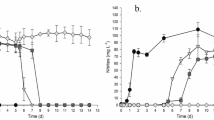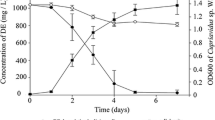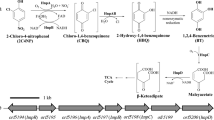Abstract
The dibenzothiophene-desulfurizing nocardioform bacteria, Gordonia sp. TM414, was isolated from oil-contaminated soil. To avoid coloration of the oil layer after the desulfurization reaction, which could decrease the quality of the oil, two colorless knock-out mutants, TPc and TPd, were isolated by using a broad-host-range transposon complex. Genomic sequence analysis revealed that the same gene was disrupted in these mutants and that the transposon-inserted gene was assigned as the gene for phytoene desaturase, crt I. The crt I mutants also showed desulfurization activity comparable to that of the parent strain in a model-oil/aqueous bi-phasic reaction, suggesting that the carotenoid production is not responsible for the bi-phasic desulfurization reaction that requires hydrophobic substrate incorporation from the organic phase.
Similar content being viewed by others
Author information
Authors and Affiliations
Rights and permissions
About this article
Cite this article
Matsui, ., Maruhashi, . Isolation of Carotenoid-deficient Mutant from Alkylated Dibenzothiophene Desulfurizing Nocardioform Bacteria, Gordonia sp. TM414. Curr Microbiol 48, 130–134 (2004). https://doi.org/10.1007/s00284-003-4141-2
Issue Date:
DOI: https://doi.org/10.1007/s00284-003-4141-2




